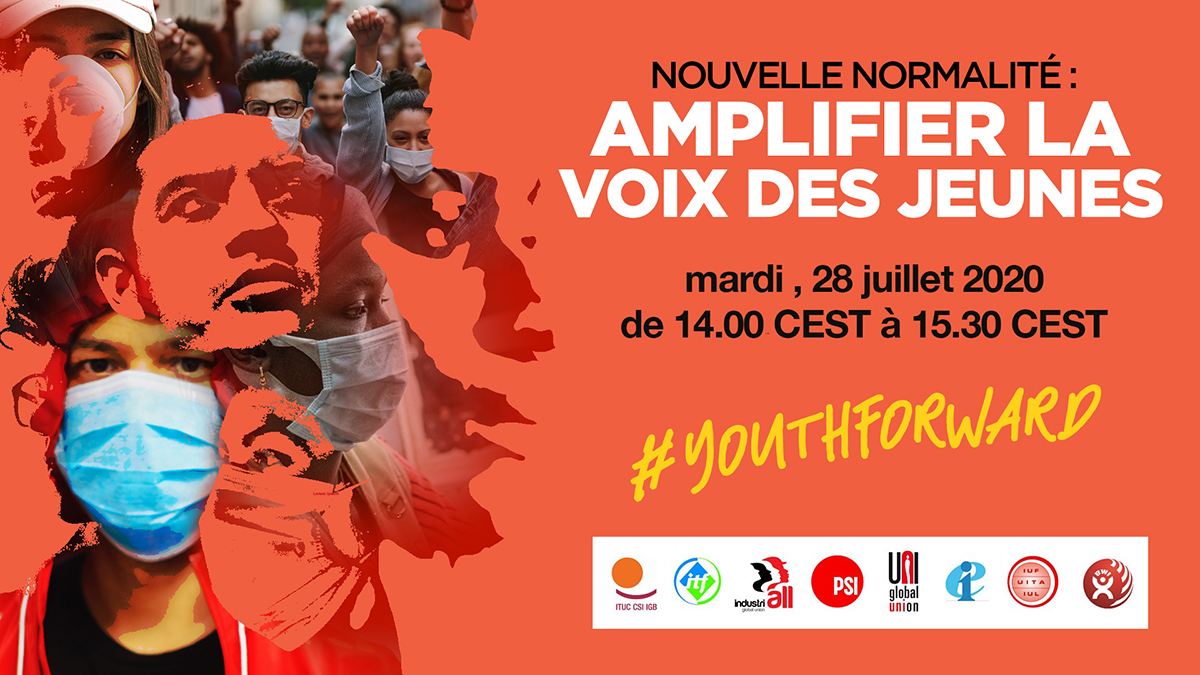Several international trade union organisations, including Education International, have organised a series of #YouthForward webinars, providing a platform for young people to share their demands. After analysing how trade unions are trying to address young people’s difficulties with COVID-19, a new webinar was a good opportunity to examine at how young workers can help to shape a “new normal”.
Nice Coronacion (SENTRO, Philippines), Dorotea Zec, (Seafarers Union of Croatia) and Sweshta Ashnah Soomungull (Confederation of Private Sector Workers, Mauritius) shared their experiences as young trade union leaders. Above all, they expressed their conviction that, in the face of this new crisis of global capitalism, and strengthened by their concern for human rights and the climate, young people in international trade union movements do not want to miss the opportunity to build something new.
Promoting an integral defence of human rights: women’s rights, climate justice, LGBT rights, the fight against racism
In the context of the global crisis, linked to the pandemic and climate change, the speakers stressed the danger of letting big business take control of change and reaffirmed the crucial role of trade unions in helping to define the new normal.
First of all, the speakers reiterated the urgency of ensuring worker safety. During the pandemic, in some countries the issue of worker safety was not even raised, even though workers are highly exposed, or on the front line. In these cases, the speakers call for Covid-19 to be recognised as an occupational disease.
Beyond the economic balance of power, the young leaders call for support for new trade union fights for:
-
The climate and working conditions: One speaker stressed that the fight for suitable working conditions and the climate go hand in hand, because without addressing climate change, it is impossible to ensure good working conditions in the future.
-
Equal power for women: “If we want to build a new normal, States must ratify ILO Convention 190 [for the elimination of violence and harassment in the world of work] » stated Nice Coronacion, a trade union leader who is particularly active on gender issues.
-
Fair and sustainable jobs: While it is important to integrate young people into production processes, it is equally important to fight for fair and sustainable jobs and to take into account the specific needs of workers, especially migrant workers.
As these subjects are considered too controversial by other types of social movements in their countries, youth movements fight to promote the integral defence of human rights in particular within the framework of their trade union organisations, and thus address the issues of the fight against racism, the defence of LGBTQI+ workers, the struggle to defend the rights of migrants, and women’s rights.
Education on rights and trade unionism
In order to move the lines on gender issues, climate justice, without losing sight of their aims, the speakers stressed the importance of:
-
Raising awareness among children and young people through education
-
Education on workers’ rights: In order to have their rights recognised, workers and employers need to know their social protection rights, a particularly critical issue for some workers, including domestic workers.
-
Building strong organisations: By recruiting more workers and supporters and enabling young workers to learn more about the trade union movement.
Mobilising young people and making their voices heard
According to the speakers, “all young people should be in trade unions”. With the lockdown and remote work becoming more common, other questions have arisen. How do you unionise people who work from home? What can the trade union movement do in this new situation?
In their view, trade union movements need to invest in platforms, and use social media to reach out to young people. They emphasise that for this to work, the education of members is very important. In a 4.0 industry, it is essential for them to be familiar with the platforms available to us, especially since technology has made it possible to help their members during the pandemic. In short, “instead of writing big newspaper articles”, trade union movements will need to take concrete action to recruit more young people.
In conclusion, the moderator, Deiby Porras Arias, said that “amplifying the voices of young people means ensuring that they are part of the whole field of social transformation”. He stressed that young people are not only tomorrow’s future leaders, but today’s leaders, as they are concerned and working to put many issues on the political agenda. To accompany this process, trade unionism should therefore go beyond trade union programmes, including working with broader social movements. In addition to the fight for decent working conditions, it is therefore also about inventing a new model of society, for climate justice, for human rights, solidarity, inclusion… In this process, the role of young women and men is central, and they have demonstrated their capacity to generate the vision of what they want for the future.

The webinar was co-organised by UNI Global Union, PSI – Public Services International, International Transport Workers’ Federation, IndustriALL Global Union, IUF Uniting Food, Farm and Hotel Workers World-Wide, Education International, and BWI Global Union, and supported by Friedrich-Ebert-Stiftung.





